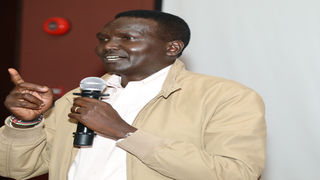
National Olympic Committee of Kenya (NOC-K) President Paul Tergat speaks during a retreat between NOC-K and Ministry of Sports to discuss Tokyo 2020 Olympics preparations in Naivasha on December 17, 2020.
| Pool | NOC-KAthletics
Premium
Dr Rosa: Kenya needs full year to prepare for 10,000m Olympic gold
What you need to know:
- Kamathi reclaimed the title previously won twice in a row at the World Championships through Paul Kipkoech (1987, Rome) and Moses Tanui (1991, Tokyo).
- Naftali Temu remains the only Kenyan to have won an Olympic 10,000m gold which he did way back at the 1968 Mexico Games.
Veteran Italian athletics manager and coach Gabrielle Rosa says Kenya needs at least one full year to train athletes that can challenge for the 10,000 metres gold medal at the Olympic Games or World Championships.
Rosa, who founded the Rosa Associati management stable that has produced numerous world and Olympic athletics champions, said the 10,000m is a race that needs special attention and preparation.
He spoke on Monday as Athletics Kenya President Jackson Tuwei announced that the federation would launch a long-time training camp for 10,000m medal prospects ahead of July’s Tokyo Olympic Games.
Kenya last won a major 10,000m gold medal 20 years ago when Charles Kamathi outwitted Ethiopian legend Haile Gebrselassie to win the title at the Edmonton World Championships in 2001, clocking 27 minutes, 53.25 seconds. Ethiopian Assefa Mezgebu took silver in 27:53.97 while Gebrselassie settled for bronze in 27:53.41.
Kamathi reclaimed the title previously won twice in a row at the World Championships through Paul Kipkoech (1987, Rome) and Moses Tanui (1991, Tokyo).
Naftali Temu remains the only Kenyan to have won an Olympic 10,000m gold which he did way back at the 1968 Mexico Games.
It was also Kenya’s first Olympic gold medal in any event.
“Dr Rosa,” as the Italian tactician is popularly known, noted that the decline in interest in cross country running also contributed to the falling 10,000m standards, generally.
The Italian is credited with nurturing and developing talented stars such as Tanui, Kamathi and former 10,000m and marathon world record holder Paul Tergat.
Tergat, currently President of the National Olympic Committee of Kenya (NOC-K) broke the world 10,000m record on August 22, 1997, in Brussels, running 26:27.85, just over a month after Gebrselassie had set the mark at 26:31.31.
The Ethiopian took the record back at 26:22.75 a year.
“For the 10,000m, you need to improve endurance, be very fit and fast,” Rosa explained.
“When Paul broke the 10,000m world record, he was training in St Moritz (in the Swiss mountains) and he was ready because he was also competing well in the cross country.
Rosa says the 10,000m being a tactical race, teamwork is as important a strategy as is speed and endurance training.
“The problem is that now the World Cross Country Championships are held once every two years and there are not enough 10,000m races on the international circuit.
“The athletes have to survive and it’s a business and that’s why many of them are moving to the road races and not focusing on the track,” Rosa further argues, maintaining that one year’s training is required to develop a good 10,000m runner.
One year project
“It’s about endurance and speed and it’s a one year project without changing coaches.
“The problem with Kenya’s preparations for the Olympic Games or World Championships is that an athlete gets a new coach two months to the competition after training with different coaches throughout the season.”
Meanwhile, Kenya’s pioneer world marathon champion Douglas Wakiihuri adds that Kenya needs a technical team to look at long-term preparations for the 10,000m gold to be a reality.
“In fact, we should be looking at preparations for the 2024 Olympic Games in Paris now.
Wholesome approach
“We need a wholesome approach to preparations — 20 years is too long to wait for a gold medal,” he said in reference to Kenya’s 20-year gold drought in the 10,000m.
Scholar Byron Kipchumba adds that Kenyan coaching needs to go scientific and that there’s need to embrace sports psychology.
“The cadre of coaches we have today is short on the current scientific coaching. There is need for more conversation on how to retrain our coaches to retool them on new approaches to coaching distance running,” Kipchumba said yesterday.
“Second, sports psychologists have to be on board in coaching staples. The impact of early transition to road races, half and marathons have huge toll on 10,000m.





